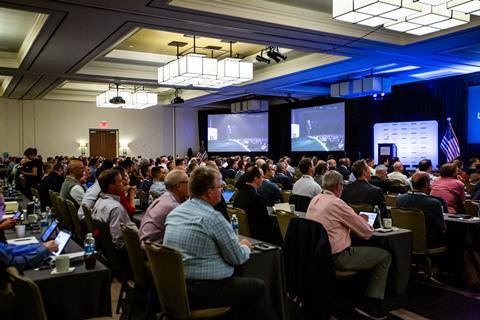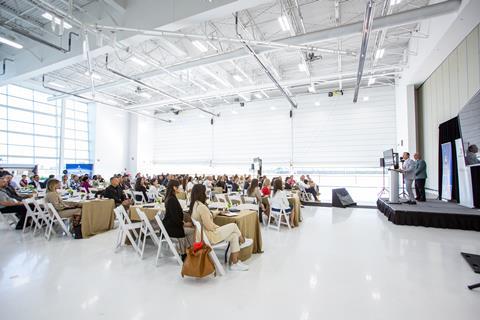On 12 November, more than 450 aviation professionals will descend upon Wichita, Kansas, for Bombardier’s annual Safety Standdown seminar to spend three days talking about everything safety. They will be joined by up to 1,000 virtual attendees from countless countries around the world, and several young aviation newbies just getting their feet wet in the industry. The free-to-attend Bombardier Safety Standdown conference is a very visible commitment by Bombardier to continuously improve safety cultures and standards throughout the industry. Now in its 28th year, the event remains as popular – and essential – as ever.

Modern aviation has an impressive safety record. That is partly the result of technology that has built numerous redundancies and safeguards into modern aircraft. However, incident- or accident-free flying can never be taken for granted, and much of that positive trend can be attributed to industry leaders reinforcing the need for constant vigilance, training for the unexpected, and ensuring lessons are always learned. Bombardier has played a big role in ensuring that ethos permeates throughout the industry.
This year’s Safety Standdown – which takes place at the Regency Hotel close to the company’s headquarters for Bombardier Defense, Bombardier’s flight-test centre and the Wichita service facility – has an impressive line-up of guest speakers, including Tony Kern, founding partner and CEO of Convergent Performance; Michael Graham from the National Transportation Safety Board; and Aviation Safety Solutions’ Amanda Ferraro.
However, the benefit from attending the event comes not only from the formal programme but from the opportunity for delegates to interact informally. “It’s what people talk about over lunch, dinner, and the coffee breaks that really drives the agenda,” maintains Chris Milligan, Bombardier’s vice president, pre-owned aircraft services and flight operations, who has overseen Safety Standdown since 2021.
This year’s Safety Standdown carries the theme, “Elevate Your Influence,” notes Milligan. “It’s all about encouraging attendees to come together to share insights, strategies, and best practices, elevating individual influence and collectively shape the trajectory of safety among all aviation professionals. It fits nicely into the Safety Standdown motto: seize the opportunity to inspire (learn), innovate (apply), and collaborate (share) relentlessly, ensuring that safety remains the cornerstone of our industry.”
Safety Standdown began as an event created by the Bombardier Learjet operations team as a human-factors safety training seminar, but quickly evolved. By 1999, Bombardier had opened Safety Standdown to all pilots sparking interest throughout the aviator community. At the same time, its attendance broadened to include managers and operations specialists, as well as cabin crew. In 2010, Safety Standdown expanded beyond the seminars into a year-round global human factors programme offering online resources
And the event does not just attract experienced professionals. “In recent years, we’ve had a real focus on emerging leaders,” says Milligan. “We’ve had a great turnout from those in their first and second years in the business, and we make sure we reserve places for those new to the sector. It’s all about creating a culture of learning and openness, so there’s no intimidation factor for those who have plenty of questions. Whether you have been in the industry for one year or many years, there is always something to learn.”

The increasingly diverse attendance at Safety Standdown prompted Bombardier to launch a second event last year, specifically for cabin crew, although open to managers, pilots, and other professionals as well. The second annual Flight Attendant Safety Summit – which was held at Bombardier’s Laurent Beaudoin Completion Centre in Montreal on August 8 – attracted 112 attendees from as far afield as Hong Kong and the United Arab Emirates (UAE). That was roughly double the attendance of the first edition.
While the event is still very much about making aviation safer, this time the focus is on the cabin, and the vital role flight attendants have in ensuring the safety of every operation. This ranges from the obvious – passenger safety briefings and ensuring evacuation equipment is in order – to food safety and galley hygiene, government regulations for cabin crew, and ways to stay healthy and alert while travelling through multiple time zones.
“What happens at the back of the aircraft is crucial to the safety of any flight,” says Milligan. “The Bombardier Flight Attendant Safety Summit highlights the increasing recognition of the role of flight attendants in safety for the business aviation community and is the continuation of a journey we began in 2023, dedicated to empowering flight attendants with essential safety knowledge and skills.”

Milligan insists Bombardier’s commitment to safety reaches from CEO Éric Martel to every employee in the organization. “Éric has a morning briefing with his senior executives at which safety is the first item on the agenda,” Milligan says. “At every site, the daily morning meeting starts with safety. Issues can range from those we deal with locally up to those reportable to the CEO, but we never hesitate to elevate something if we feel that is the right thing to do.”
Safety at Bombardier spans the entire ecosystem including operation, maintenance and manufacturing, adds Milligan, and does not just cover procedures. The company has an extensive Safety Management System (SMS) which began in 2006 with its maintenance and Approved Maintenance Organization (AMO) facilities in Toronto and was expanded in 2009 to include all its manufacturing facilities, parts and services distribution centres and design facilities worldwide.
Milligan sums Bombardier’s overall commitment to safety succinctly: “Together we have the power to make a lasting impact and create a safer future for aviation worldwide,” he says. “We want to influence those around us on a daily basis.”




















